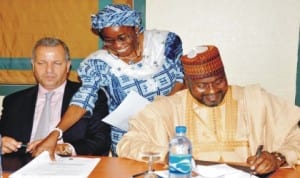Business
IMF Announces 8.5% GDP Growth For DRC

Minister of State for Power, Mr Mohammed Wakil (right), with team leader of American investors, Mr Roy Tefeez (left), signing a Memorandum of Understanding on power in Abuja last Monday. With them is Director, Legal Services, Ministry of Power, Mrs Adedotun Shoetan.
The International Mon
etary Fund (IMF) says the Democratic Republic of Congo (DRC) has witnessed 8.5 per cent GDP growth in 2013.
An IMF Executive Board report at the end of an Article IV consultation in DRC stated that the country also recorded an average of seven per cent growth between 2010 and 2012.
The report said that the Democratic Republic of Congo had continued to post strong economic growth in the recent years in spite of the difficult domestic security situation.
“Mineral production and related investments have become the main growth drivers, although economic activity is strengthening in other areas such as the agriculture.
“This has resulted in real Gross Domestic Product growth rate of 8.5 percent in 2013,’’ the report said.
It said that fiscal restraint and the absence of major external price shocks helped to further reduce inflation to a record low of one per cent at the end of 2013. “Higher mining exports and sustained inward foreign investment contributed to an overall balance of payments surplus.
“However, gross international reserves increase in 2013 was only sufficient to keep the reserve coverage at 7.7 weeks of non-aid related imports of goods and services,’’ it said.
According to the report, exchange rate remained remarkably stable since 2010, adding “notwithstanding the strong economic growth, poverty remains pervasive and the economy vulnerable.’’
It said that limited fiscal space and shocks to revenues often offset by expenditure adjustments did not support pro-poor and critical investment spending necessary for inclusive growth.
“The government implemented important reforms aimed at ‘de-dollarising’ the economy, deepening financial markets and improving public finance management,’’ it said.
The report said the executive board commended the authorities for maintaining macro-economic stability in the face of a challenging external and domestic environment.
“The board also emphasised the importance of creating fiscal space to increase priority social spending and support public investments for meeting the MDGs.
“This is possible through improvements in public financial management, better alignment of the budget with the Poverty Reduction Strategy Paper and strengthened revenue mobilisation,’’ it said.
Business
Fidelity Bank To Empower Women With Sustainable Entrepreneurship Skills, HAP2.0
Business
President Tinubu Approves Extension Ban On Raw Shea Nut Export
Business
Crisis Response: EU-project Delivers New Vet. Clinic To Katsina Govt.
-

 News2 days ago
News2 days agoAmend Constitution To Accommodate State Police, Tinubu Tells Senators
-

 Politics2 days ago
Politics2 days agoSenate Urges Tinubu To Sack CAC Boss
-

 News2 days ago
News2 days agoDisu Takes Over As New IGP …Declares Total War On Corruption, Impunity
-
Business2 days ago
President Tinubu Extends Raw Shea Nuts Export Ban To 2027
-
Business2 days ago
Crisis Response: EU-project Delivers New Vet. Clinic To Katsina Govt.
-
Business2 days ago
President Tinubu Approves Extension Ban On Raw Shea Nut Export
-
Sports2 days ago
NDG: Rivers Coach Appeal To NDDC In Talent Discovery
-
Rivers2 days ago
Etche Clan Urges Govt On Chieftaincy Recognition

